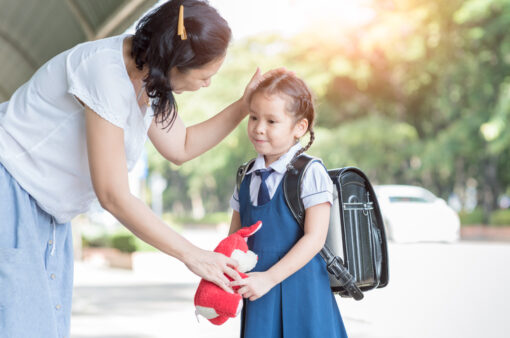Are you feeling uncertain how your child will adapt and cope going back to school this year?
Maybe your child is starting school for the first time…..are they worried?
Are you worried for them?
Returning to school or heading off to Kindergarten for the first time can bring many challenges for parents. Kids are out of routine, have become lazy and may have picked up a few habits over the break. In a 6-8 week school holiday period, children also go through changes in their bodies such as hormone surges. This can be unexpected as a parent, and make feel like you’re losing control and have to go back to the old parenting drawing board. Kids going off to Kindy may feel anxious about their first day and what to expect. As a parent, it’s important to assist your child to ‘change’ what they’ve become comfortable with, and transition them back to school calmly and confidently.
With a little planning, you CAN make heading off to school simple and stress free for your family.

It’s normal the morning before school starts that your child may appear as feeling unhappy. Many parents will see an anxious child in-front of them. There may be tears, worry, or they may make excuses to get out of going; such as they have a sore stomach/headache, etc. You may even hear “I don’t want to go to school, can I stay home?”
Some children can worry themselves so much that they feel sick, however if you let them stay home, you’ll find this could turn into repeated school refusal in the future.
The long-term affect you’ll see is:
- a decrease in their academic development
- a decrease in social confidence
- If it persists, they’ll fall further behind in class making it harder on you to guide them to reintegrate into their social groups and return to school.
6 ways to prepare your anxious child for the return to school
- Talk about school – On the lead up, each day talk to your child about returning or heading off to school if it’s their first time. Make sure that returning or going to school is not a surprise, and they are aware it’s coming up soon. Put a calendar on the fridge so they can see when it’s coming.
- What did they enjoy the most at school? – Highlight the things they previously enjoyed the most, or some exciting things that they get to look forward to doing. Talk about the fun of doing this again with friends (e.g. playing soccer at lunch, art/crafts, seeing their friends at recess), or meeting new friends and having fun with them.
- Routine is key – Remind them of the routine at school. Plan it out so they know in advance (e.g. waking up at 7:30, eating breakfast and packing their bag, and leaving for school at 8:15, etc). If it’s their first year, do a few practice runs leading up to when they start so they can get excited. Why not try a drawing together, and draw some steps of getting ready in the morning so they can tick them off as they go.
- Give them choice – Ask them what they’d like for lunch to help them feel like they have some control, and can choose what they enjoy. Put something fun in their lunchbox to look forward to.
- Open communication – If your child seems worried, create an open and accepting space for them to talk about their worries. It’s best not to wait until the night before school to do this. Make sure you validate what they feel, however don’t imply that they can stay home and not go to school.
- The drop-off process – if they become increasingly upset at drop off, acknowledge their emotion, give them a hug, guide them into school, and leave. The longer you stay the longer the distress will last. Teachers often report that a few minutes after the parents leave, the child settles.
Remember, the first few days, or may be a week will be the most challenging, however children become more and more adaptable as they grow. They will see quickly what their new routine looks like and make new friends, or re-connect with old friends that they have fun with. The key is to talk through things in advance, to ensure they have time to process the information, and to ensure they feel safe, calm and aware. Having an anxious child is challenging, but if you take the time to prepare them, they will learn to see that change isn’t something to worry themselves about, and to look for the good in the change.
Written by Kaja Porter – Clinical Psychologist – www.creatingchange.net.au

